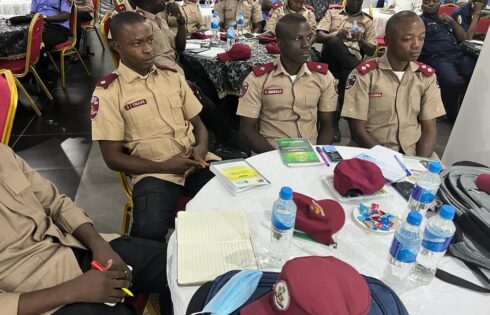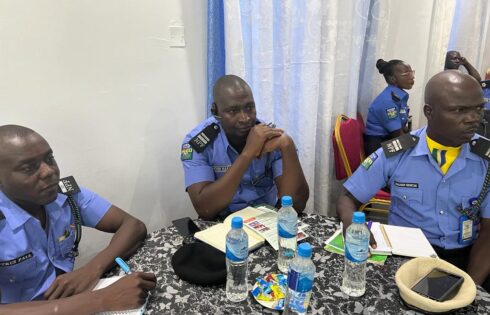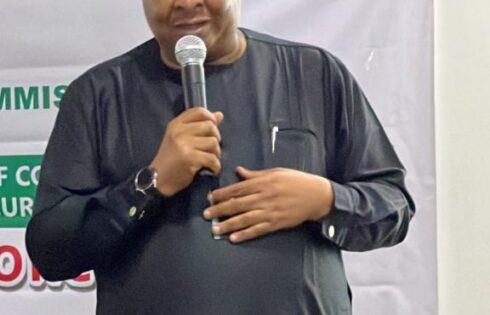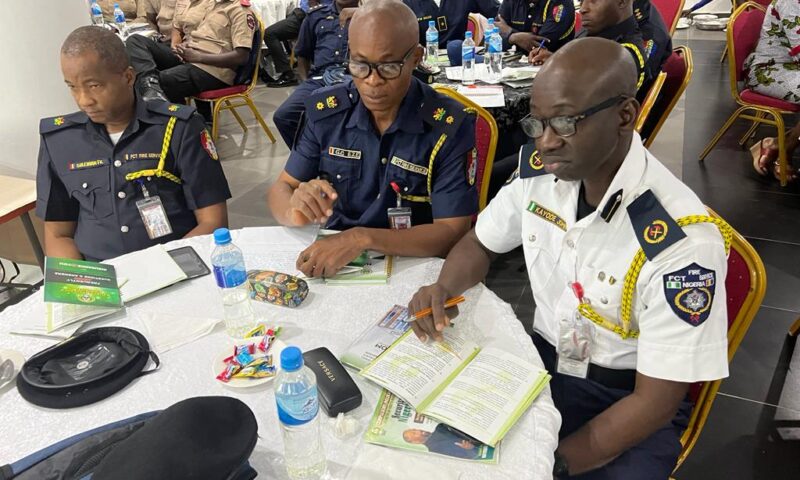REMARKS OF THE COMMISSIONER FOR INSURANCE AT THE OFFICIAL SIGNING AND PRESENTATION OF THE JOINT GUIDELINES ON SUBMISSION OF INSURANCE PROGRAMME BY OPERATORS, PROJECT PROMOTERS, ALLIANCE PARTNERS, AND NIGERIAN INDIGENOUS COMPANIES IN THE NIGERIAN OIL AND GAS INDUSTRY ISSUED BY THE NIGERIAN CONTENT DEVELOPMENT AND MONITORING BOARD and NATIONAL INSURANCE COMMISSION The Executive Secretary of the NCDMB DCT, NAICOM Chairman, NIA President, NCRIB Directors of NAICOM and NCDMB
Gentlemen of the Press Distinguished Ladies and Gentlemen It is with great delight that I address you on the occasion of the signing and unveiling of the Guidelines on the submission of Insurance Programme by Operators, Project Promoters, Alliance Partners, and Nigerian Indigenous Companies in the Nigerian Oil and Gas Industry.
The partnership between NAICOM and the NCDMB which has led to this jointly issued document is a drive towards strengthening our mutual oversight functions. The Federal Government’s drive towards enhancing local content speaks to the long-term plan burn out of good intention and strategy to grow our economy, develop the Nigerian Industries and her human capital.
It is in alignment with this national interest that we converge this day to append our signatures to the instrument that solicits information evidencing adherence to the Government’s local content determination. It is important to state that, prior to the NOGICD Act 2010, the Insurance Act 2003 made far reaching provisions for the domestication and domiciliation of insurance services in Nigeria. In particular Section 65 (7) of the Insurance Act 2003 made it compulsory for any property located in Nigeria whether moveable or immovable to be insured by a Nigerian registered insurer. Section 67 requires that insurance of all imports into Nigeria must be insured by insurers registered in Nigeria.
In addition, Section 72 prohibits any person from transacting insurance or reinsurance with foreign insurers/reinsurers except with the written permission of the Commission. Following the peculiarity of the Oil and Gas industry, the NOGICD Act was enacted which therefore facilitated the hitherto collaboration between the NCDMB and National Insurance Commission; This amongst others, led to the proactive considerations of the specific provisions of the NOGICD Act relating to the Insurance Industry. The Guidelines for Oil & Gas Insurance Business was issued in 2010 which amongst others, stipulates the roles and responsibilities of insurance institutions in ensuring compliance with local content law.
This was done with the primary consideration of ensuring that available In-Country Insurance Capacity is fully filled before any foreign consideration. The overall aim of the guideline is the development of indigenous content through increased indigenous participation. The NOGICD Act 2010 was therefore applauded by the entire insurance industry as it greatly complemented the National Insurance Commission roles and responsibilities in performing its regulatory and supervisory oversight function. In similar vein, Sections 49 and 50 of the NOGICD Act specifically relate to Insurance & Reinsurance and Approval for Offshore Insurance respectively.
The Act also contains a Schedule with recommended minimum levels of Nigerian Content Level measured by percentage spend. The historical synergy between our agencies has therefore necessitated a veritable platform for inter-agency collaboration in order to give effect to the requirements of Section 49 and 50 of the NOGICD Act 2010 by providing guidance to Operators in the Oil and Gas necessary for satisfying the provisions of the law in relation to insurance transactions.
The joint Guidelines which is today issued with the objectives of enforcing and strengthening compliance with the provisions of the referenced sections of the NOGICD Act and relevant provisions of the Insurance Act with respect to companies carrying on insurance business in the Nigerian oil and gas industry is to also enable the Board monitor utilization of in-country insurance capacity. I therefore implore all operators, project promoters, alliance partners and Nigerian indigenous companies engaged in any form of business, operations or contract in the Nigerian oil and gas industry to note that the sighted relevant laws have demanded our adherence and continued compliance, hence the issuance of this Guidelines. It is on this note that I express optimism in relation to the realization of the benefits of increased local content which are but not limited to; increased retention, growth in in-country technical capacity. Job creation and employment generation, increased penetration and GDP growth, human capacity development, and many others.
Whilst we note the need to secure domestic supply chains through strong backward domestic integration which has the potency of protecting economies from imported contagion of both a health and economic variety, we are also mindful of the capacity gap of the Supply side. Consequently, the National Insurance Commission is committed to creating an enabling environment that will consistently enhance increased capacity of the Insurance Institutions both financially and technically.
Ladies and gentlemen, I want to appreciate the joint team of NAICOM and NCDMB for the invaluable contributions towards the drafting of the Guidelines and other Templates for ease of renditions. I strongly believe that the ongoing partnership will help us discharge our duties and functions in a more effective manner.
My special appreciation goes to the Executive Secretary, NCDMB for his commitment to this course right from the conceptualization phase of this synergy. I am hopeful that this collaboration will serve as a platform to breach any observe gap between the demands of the Oil and Gas Sector and the products offered by the Insurance Industry. Ladies and Gentlemen, thank you for your attention.
Thomas O S





